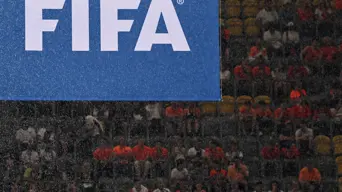Top court finds some FIFA transfer rules 'contrary to EU law'
The verdict comes as part of a case brought by former French player Lassana Diarra against FIFA, world football's governing body.

Rain falls in front of a FIFA logo before the start of the UEFA Euro 2024 semi-final football match between the Netherlands and England at the BVB Stadion in Dortmund on 10 July 2024. Picture: AFP
LUXEMBOURG - An EU court said on Friday some international football rules regulating player transfers are contrary to the bloc's laws, in a landmark decision that could shake up the system.
The Court of Justice of the European Union (CJEU) found that some FIFA restrictions to a player's ability to seek further employment after unilaterally terminating a contract hinder the EU's free movement and competition between clubs.
"The Court holds that all of those rules are contrary to EU law," it said.
The verdict comes as part of a case brought by former French player Lassana Diarra against FIFA, world football's governing body.
It could have far-reaching implications, allowing players to leave their club without fear of being legally trapped afterwards.
The case stems from a dispute between Diarra and his former club Lokomotiv Moscow a decade ago.
In August 2014, Lokomotiv terminated the former Chelsea and Real Madrid midfielder's contract citing contractual breaches by the player.
The Russian club also sought 20 million euros ($22m) compensation from Diarra.
Diarra, now 39, refused and requested that Lokomotiv pay him compensation.
He was eventually ordered to pay his former club 10 million euros by FIFA, a fine that was upheld by the Court of Arbitration for Sport. Diarra also received a backdated 15-month suspension.
According to FIFA regulations, if a player terminates his contract unilaterally and "without just cause", he must pay compensation which includes his remuneration and benefits until the end of his contract.
Additionally, a purchasing club could be held jointly liable for any compensation and, in certain cases, be banned from signing any new players for a given period.
As a result clubs were not rushing to recruit Diarra after he left Lokomotiv.
On Friday, the CJEU found that the rules impede the free movement of players and have as their object the restriction, and even prevention, of cross-border competition.